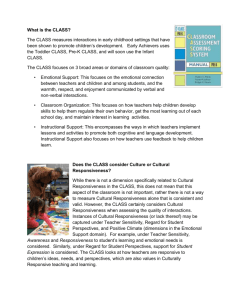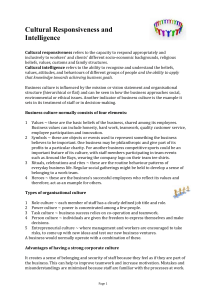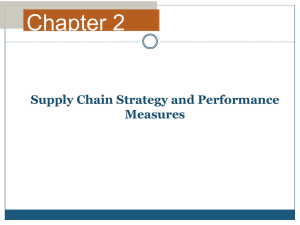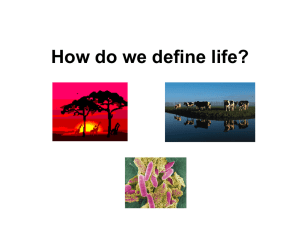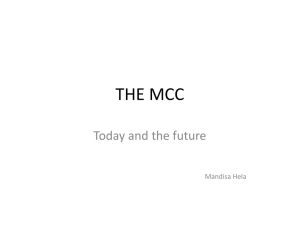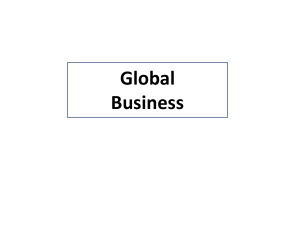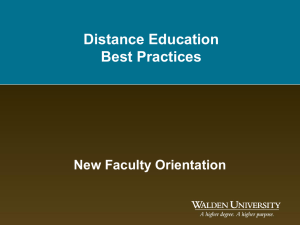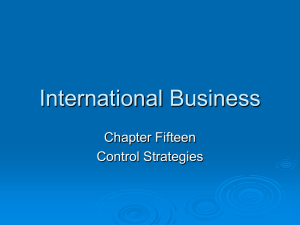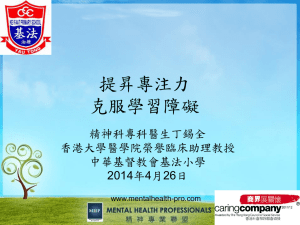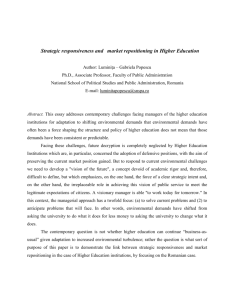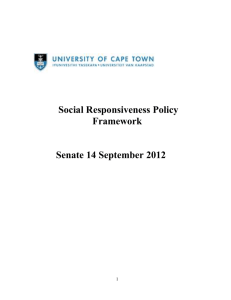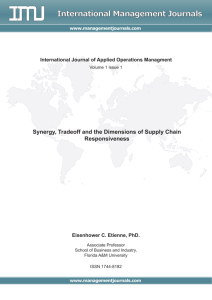Readings - The Center for Ethics & Education
advertisement
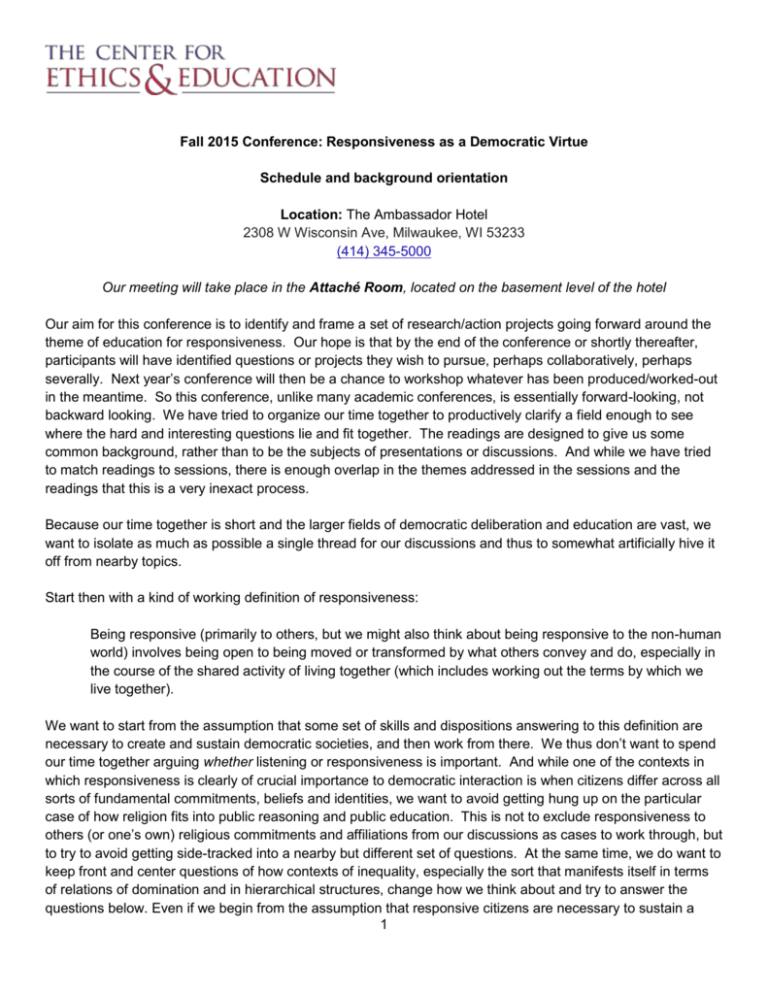
Fall 2015 Conference: Responsiveness as a Democratic Virtue Schedule and background orientation Location: The Ambassador Hotel 2308 W Wisconsin Ave, Milwaukee, WI 53233 (414) 345-5000 Our meeting will take place in the Attaché Room, located on the basement level of the hotel Our aim for this conference is to identify and frame a set of research/action projects going forward around the theme of education for responsiveness. Our hope is that by the end of the conference or shortly thereafter, participants will have identified questions or projects they wish to pursue, perhaps collaboratively, perhaps severally. Next year’s conference will then be a chance to workshop whatever has been produced/worked-out in the meantime. So this conference, unlike many academic conferences, is essentially forward-looking, not backward looking. We have tried to organize our time together to productively clarify a field enough to see where the hard and interesting questions lie and fit together. The readings are designed to give us some common background, rather than to be the subjects of presentations or discussions. And while we have tried to match readings to sessions, there is enough overlap in the themes addressed in the sessions and the readings that this is a very inexact process. Because our time together is short and the larger fields of democratic deliberation and education are vast, we want to isolate as much as possible a single thread for our discussions and thus to somewhat artificially hive it off from nearby topics. Start then with a kind of working definition of responsiveness: Being responsive (primarily to others, but we might also think about being responsive to the non-human world) involves being open to being moved or transformed by what others convey and do, especially in the course of the shared activity of living together (which includes working out the terms by which we live together). We want to start from the assumption that some set of skills and dispositions answering to this definition are necessary to create and sustain democratic societies, and then work from there. We thus don’t want to spend our time together arguing whether listening or responsiveness is important. And while one of the contexts in which responsiveness is clearly of crucial importance to democratic interaction is when citizens differ across all sorts of fundamental commitments, beliefs and identities, we want to avoid getting hung up on the particular case of how religion fits into public reasoning and public education. This is not to exclude responsiveness to others (or one’s own) religious commitments and affiliations from our discussions as cases to work through, but to try to avoid getting side-tracked into a nearby but different set of questions. At the same time, we do want to keep front and center questions of how contexts of inequality, especially the sort that manifests itself in terms of relations of domination and in hierarchical structures, change how we think about and try to answer the questions below. Even if we begin from the assumption that responsive citizens are necessary to sustain a 1 democratic society, we still need to ask what such responsiveness will look like in a society riven by inequality, and whether particular manifestations of responsiveness will need to be different for those at the top and the bottom of various hierarchies. Tentative Schedule, Questions, and Readings Thursday 6:00 Dinner Friday Breakfast available in the Attaché Room at 8:30 a.m. The Attaché is on the basement level of the hotel. Our meeting will start at 9:00 a.m. 9:00 Session 1 Introductions: We want to learn how to talk and work together and that requires knowing who each of us is and how we think about and approach the topics that will be the focus of our joint attention, as well as each of us being reflective about what we have to contribute to our work together. Please prepare some remarks of about (and not much more than) 3 minutes in length to introduce yourself to the group. We are less interested in a recitation of CV lines here than an attempt to describe how you approach these questions, what you think you bring to the table as we discuss them and what you hope to learn. How do you see the contribution of your discipline or outlook to a multi-disciplinary conversation like this one? Break Session 2 Characterizing responsiveness: Starting from the working definition above, can we give a clear and precise account of what responsiveness involves? Elaboration: What does being “moved” amount to? How is it different from merely hearing or respecting what others say, or compromising or agreeing with them? How does one manifest one’s willingness to be moved even when one does not move? How does it relate to other nearby concepts: listening, attention, openness, flexibility, being reasonable, being vulnerable, being willing to sacrifice? Is it best thought of as a virtue of individual participants in a shared practice or the practice itself? What are some concrete cases of responsiveness and unresponsiveness?. Readings: 1. Laden, A. (2014), Prologue. In Reasoning: A Social Picture. Oxford: Oxford University Press, pp. 3-7. 2. Laden, A. (2014), Reasoning as Responsive Conversation. In Reasoning: A Social Picture. Oxford University Press, pp. 138-168. 3. Allen, D. (2004), Chapters 1, 3, and 4 in Talking to Strangers: Anxieties of Citizenship since Brown v. Board of Education. Chicago: University of Chicago Press. 4. Owen, D. and Bentley, R. (2007). Ethical loyalties, civic virtues and the circumstances of politics.” Philosophical Explorations: An International Journal for the Philosophy of Mind and Action 4:3, 223-239. 5. Parker, W. (2010). Listening to strangers: Classroom discussion in democratic education. Teachers College Record Volume 112, Number 11, November 2010, pp. 2815–2832. 6. Bickford, S. (2011). Emotion talk and political judgment. The Journal of Politics, vol 73, 4, pp. 10251037. 2 Lunch. Noon in the hotel dining room. Session 3 Thinking about cases: As way of grounding our conversation in some common cases, we are asking everyone to listen to two recent stories from This American Life. Please listen to these prior to the meeting. During this session, we will break up into small groups to consider the stories in light of our discussion on characterizing responsiveness. This American Life Podcasts: 1. “The Problem We All Live With” (aired July 21, 2015. Follow this link to listen and/ or download) 2. “The Problem We All Live With, Part II” (aired August 7, 2015. Follow this link to listen and/or download) Break Session 4 The moral psychology of the responsive citizen Is there a particular way of conceiving of our psychology that helps to understand both what responsiveness entails, and how it might be developed, sustained and cultivated as well as what might block or hinder those processes? Elaboration: Part of what is important to keep in mind here is that responsive citizens need to be both flexible and open and vulnerable and yet not without strong moral, religious, cultural or other commitments and principles. So we need a clear picture or pictures of what the principled, committed but responsive citizen looks like and how that can be a coherent way to be.) Readings: 1. Levine, P. (work in progress): “Ethics and network theory” 2. Nucci, L. and Gee, R. (in press). “Moral education.” In M. D. Waggoner & N. C. Walker (Eds.) The Oxford Handbook of Religion and American Education. Oxford, UK: Oxford University Press. 4:30 break until dinner 6:00 Dinner Saturday 8:30 a.m. – noon Breakfast available in the Attaché Room at 8:30 a.m. The Attaché on the basement level of the hotel. Our meeting will start at 9:00 a.m. Session 5 Supportive (and destructive) conditions for responsiveness Are there particular kinds of practices and/or institutional and cultural structures and norms that support the cultivation and sustaining of responsiveness? Are there practices, kinds of institutions and norms that interfere with these? Readings: 1. Coates, T. (2015). Excerpt from Between the World and Me. New York: Spiegel&Grau. pp. 5-34. 2. Bickford, S. (2000). Constructing inequality: City spaces and the architecture of citizenship. Political Theory, Vol. 28, No. 3, pp. 355-376. 3 3. Allen, D. (2015). “Reconceiving public spheres: The flow dynamics model.” In D. Allen & J. Light (eds)., From Voice to Influence (pp.178-205). Chicago: University of Chicago Press. 4. Dewey, J. (1903). “Democracy in education.” The Elementary School Teacher, Vol. 4, No. 4. pp. 193204. 5. Laden, A. (2013). “Learning to be equal: The justice of schools as schools of justice.” In D. Allen & R. Reich (Eds.) Education, Justice, and Democracy. Chicago: University of Chicago Press, pp. 62-79. 3 Breakout sessions: We will form three different working groups around these issues. A. Methods of teaching responsiveness: How can we teach/cultivate/foster/develop responsiveness in those who do not yet manifest it or do so only intermittently and not yet virtuously? B. Methods of indirectly fostering responsiveness: What sorts of implications are there for the organization of schools, districts, neighborhoods, other social spaces if a democracy takes as one of its requirements the cultivation of responsiveness in its citizens. C. Measuring progress: How might we determine where there is responsiveness and whether it is improving, growing, etc? Where should we look? What might serve as reasonable proxies? How could we code for it in evaluating conversations? Conclusion: Reporting back and next steps Box lunches available at noon 4
